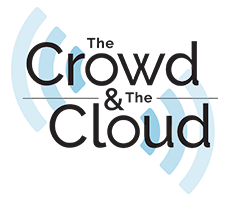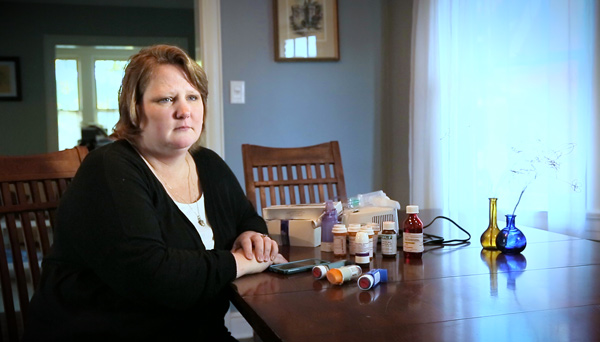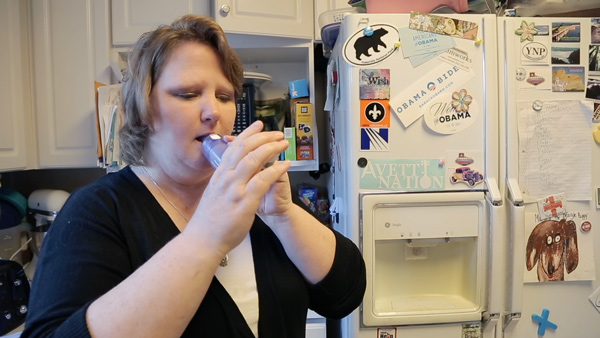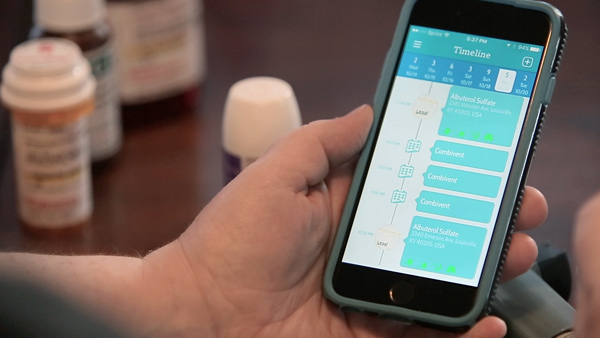
Newsletter
Sign up and stay in-the-know about The Crowd & The Cloud and the world of citizen science.


My name is Dawn Sirek and I'm a trauma nurse in the emergency room at Kosair Children’s Hospital. It's a pediatric facility.
Tell us a little about yourself and what you do?
As a trauma nurse, you never know what's going to happen on an average day. We take care of children from all over Kentucky, Indiana, and sometimes Tennessee. We get everything. The sickest. We get a lot of child abuse. A lot of trauma. A lot of really, really sick kids. We can take care of broken bones, puncture wounds, and gunshots. We also see a lot of kids with asthma, from mild asthma to very severe asthma. Uncontrolled kids that come in not breathing, very sick.

I was officially diagnosed a year ago with asthma. I probably had it a while before that, I just didn't understand, or didn't know. I have always been sick in the winter, a little bit more than everybody else. It takes me a little bit longer to get well, and I just figured that's normal. I didn't know. A year ago, I caught just a normal cold virus. I ended up in the ICU with horrible pneumonia that nearly took my life. Since that point, I have had severe uncontrolled asthma. Asthma is classified as mild, moderate, and severe. Severe asthma takes a lot of intervention, it is not controlled with a plain control medicine.
Since I started with Propeller Health and Air Louisville, the sensors on my inhalers have really pointed out that my asthma is not well controlled. Just recently, I added a bunch of different medicines to my regimens. This is what asthma means to me. I do one inhaler twice a day, another inhaler twice a day, a third inhaler twice a day, and then a fourth inhaler as needed. About every four hours, I do something to treat my asthma every day. I track all of these medicines with the Propeller app on my iPhone.
How did you get involved in Propeller Health?
It was on the front page of the paper when Air Louisville had their kickoff campaign. I pay attention to everything about asthma. Then it came across my Facebook feed that they were enrolling people to have the sensors. I contacted Melissa Williams, with Propeller Health, and I had my sensors within a couple of days. It's been a neat thing to be able to track my usage.

With asthma, the two big components to proper treatment are education and compliance. You have to take your meds every single day. Even when you're symptom free, you have to take your medicine. The Propeller system tracks compliance and symptoms, where you are, time of day, and location in the city. It's helped me figure out what my triggers are.
I feel like the app is my friend. You use your inhaler, and it sends me a little text message. It beeps and says, "Oh, you're having a bad day. Hope you feel better soon." Somebody else knows that I'm having a bad day. I don't talk about my asthma very often. It's helped me to have a little friend that understands where I am, even if it's just a simple little app on my phone. It feels like Big Brother. I always tease my husband that if I'm ever kidnapped and all I have is my inhaler, they're going to be able to find me.
What does it feel like having asthma?
It feels like an elephant is sitting on my chest. It's very painful. If you're going to blow up a balloon for the very first time, and it's really tight and hard to blow up, that's how it feels like to breathe. If you blow up the balloon once, then it's easier to blow up the second time. My balloons never get easier to blow up. It feels like that every single time I take a breath.
Asthma's a lonely disease. We don't talk about it very often. If you're a non asthmatic, then you don't have to think about breathing. When you're an asthmatic, breathing is exhausting. All that I can do some days is breathe. If you've never felt that, you can't quite understand what it is to struggle for every single breath. My friends and my family, they all know that I have asthma. Often, I don't look like I'm struggling, and it appears that I'm fine, when really, I'm struggling to take every single breath.
How does the app help you control your asthma symptoms?
The Propeller app is on my phone, and everytime I use my inhaler, the sensor sends a signal to the app and it logs it for me. It's really cool. It gives me all kinds of details. It tells me how many days in the last month that I've had symptoms, how many times I've used my rescue inhaler this week. It tells me the last several months, how compliant I've been with my daily meds. The idea is that my doctor would just be able to have this information as well. What happens with asthma is that it's very in the moment. Right now I could be wheezing and coughing and having trouble breathing, but tomorrow when I go to my doctor I could be perfect. This (app) allows the doctor a good snapshot of what happens every day. It allows for better treatment.

What is really good about the Propeller app is that it helps with compliance because you get a notification on your phone every time that you have a scheduled medication. I think that these sensors are going to revolutionize asthma treatments. It's very exciting. My background being a pediatric nurse in a city that is number one for asthma, it's been a concern of mine for a long time.
How exactly do you think the Propeller app will revolutionize asthma treatments?
Parents don't often know that their child hasn't taken their medicine. Doctors don't often know if their patients have taken their medicine. This is an efficient way to track compliance. Eventually the app will also track lung function, which is the other key (factor) in pediatric treatment of asthma. That, in itself, leads to education which is the other part of asthma treatment. You have to be educated about what asthma is, how it works, how your body works, and what the symptoms are. You need to know how important it is to treat it early before it gets serious, and then how important it is to continue to take your medicine even when you don't feel sick. I just can't say how amazing it is. Other than a cure, this is the best thing for asthma.
